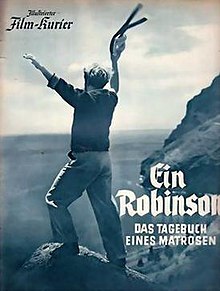A German Robinson Crusoe (German: Ein Robinson) is a 1940 German drama film directed by Arnold Fanck and starring Herbert A.E. Böhme, Marieluise Claudius, and Claus Clausen. Written by Arnold Fanck and Rolf Meyer, the film is a modern-day Robinson Crusoe story about a man so angry about the post-World War I conditions in Weimar Germany that he voluntarily goes to live on a desert island. The film was shot partly on location in South America.[1]
| A German Robinson Crusoe | |
|---|---|
 German film poster | |
| German | Ein Robinson |
| Directed by | Arnold Fanck |
| Written by | Arnold Fanck Rolf Meyer |
| Produced by | Oskar Marion Wilhelm Sperber |
| Starring | Herbert A.E. Böhme Marieluise Claudius Claus Clausen |
| Cinematography | Sepp Allgeier Albert Benitz Hans Ert |
| Edited by | Arnold Fanck Johannes Lüdke |
| Music by | Werner Bochmann |
Production company | Bavaria-Filmkunst |
| Distributed by | Bavaria-Filmverleih |
Release date |
|
Running time | 81 minutes |
| Country | Germany |
| Language | German |
Plot
editDuring World War I, the German cruiser SMS Dresden is attacked by British ships off the coast of Chile. The crew manage to abandon ship before it sinks. They make their way to an isolated island where they are taken prisoner. After spending three years in custody, the sailors manage to escape and make their way back to Germany, intending to continue fighting for their Fatherland. When they arrive, however, they encounter a different Germany from the one they left behind—one where they are ridiculed and attacked by mutineers.
One of the returning crew, Carl Ohlse, leaves Weimar Germany and returns to the island where he had been held prisoner for three years, determined to live out the rest of his life as a Robinson Crusoe. Some time later, he hears a radio report that describes how things have improved in Germany during the 1930s. Later, when the new SMS Dresden passes the island, he makes his way to the ship and is taken aboard by his new respectful comrades.
Cast
edit- Herbert A.E. Böhme as Carl Ohlsen
- Marieluise Claudius as Antje
- Claus Clausen as Fritz Grothe
- Oskar Marion as captain
- Malte Jäger as officer
- Wilhelm P. Krüger as Pagels
- Otto Kronburger as commander
- Wolf Dietrich as officer
- Ludwig Schmid-Wildy as sailor
- Leopold Kerscher as sailor
- Martin Rickelt as sailor Peter
- Georg Völkel as 1. officer
- Hans Kühlewein as Obermaat
- Charly Berger as staff surgeon
- Günther Polensen as sailor
- Hans-Joachim Fanck as little Peter
Production
editA German Robinson Crusoe was directed by Arnold Fanck.[2]
Release
editIt was banned from being shown in Germany by the Allied High Commission after World War II.[2]
References
edit- ^ Hake, Sabine (2009). Bock, Hans-Michael; Bergfelder, Tim (eds.). The Concise Cinegraph: Encyclopaedia of German Cinema. New York: Berghahn Books. p. 372. doi:10.2307/j.ctt1x76dm6. ISBN 978-1571816559. JSTOR j.ctt1x76dm6. S2CID 252868046.
- ^ a b Kelson 1996, p. 17.
Works cited
edit- Kelson, John (1996). Catalogue of Forbidden German Feature and Short Film Productions held in Zonal Film Archives of Film Section, Information Services Division, Control Commission for Germany, (BE) (2 ed.). Greenwood Publishing Group. ISBN 0948911190.
Further reading
edit- Rentschler, Eric (1996). The Ministry of Illusion: Nazi Cinema and Its Afterlife. Cambridge, Mass: Harvard University Press. ISBN 978-0-674-57640-7.
- Richards, Jeffrey (1973). Visions of Yesterday. London: Routledge & K. Paul. ISBN 978-0-7100-7576-5.
- Welch, David (2001). Propaganda and the German Cinema, 1933–1945. London: I.B. Tauris. ISBN 978-1-86064-520-4.
External links
edit